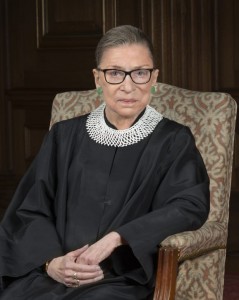Ginsburg Becomes First Woman to Lie in State
Friday, September 25th, 2020
The flag-draped casket of the late Supreme Court Justice Ruth Bader Ginsburg lies in state inside Statuary Hall of the U.S. Capitol in Washington, D.C., on Sept. 25, 2020.
Credit: © Erin Schaff, POOL/AFP/Getty Images
On Friday, the late Associate Justice of the Supreme Court Ruth Bader Ginsburg became the first woman to lie in state at the U.S. Capitol, with her casket on display in Statuary Hall. Ginsburg is also the first Jewish person to lie in state. To lie in state is a great honor, reserved for the country’s most distinguished citizens.
The tradition dates back to 1852, when the American statesman Henry Clay became the first person to receive the honor. Other people to lie in state include judges, military leaders, representatives, senators, and presidents. Aside from lying in state—as Ginsburg is—honorees can lie in honor or lie in repose. The Black civil rights activist Rosa Parks, for example, lay in honor following her death in 2005. Ginsburg will be buried at Arlington National Cemetery, one of the largest and most famous cemeteries in the United States.

Ruth Bader Ginsburg (1933-2020), associate justice of the Supreme Court of the United States
Credit: Supreme Court of the United States
Ginsburg, a legal and feminist icon, died on Friday, September 18, at the age of 87. Ginsburg served on the Supreme Court from 1993 to 2020. As a Supreme Court justice, she provided a steady liberal voice and was a passionate supporter of women’s rights.
Ginsberg was the second woman to serve on the court. Sandra Day O’Connor became the first in 1981. President Bill Clinton appointed Ginsburg to the court to fill the vacancy created by the retirement of Justice Byron R. White.
Ruth Bader was born on March 15, 1933, in New York City. She graduated from Cornell University in 1954. She married Martin D. Ginsburg, who also became a lawyer, later that year. She earned a law degree from Columbia University in 1959.
Ginsburg taught law at Rutgers, the State University of New Jersey, from 1963 to 1972 and at Columbia University from 1972 to 1980. During the 1970′s, Ginsburg served as general counsel to the American Civil Liberties Union, an organization that works for citizens’ rights. In this position, she argued before the Supreme Court and won many cases involving equality between the sexes. She actively supported women’s rights.
In 1980, President Jimmy Carter appointed Ginsburg to the United States Court of Appeals for the District of Columbia. During her years as a member of this court, she became known for working to bring about agreement between her liberal and conservative colleagues.


